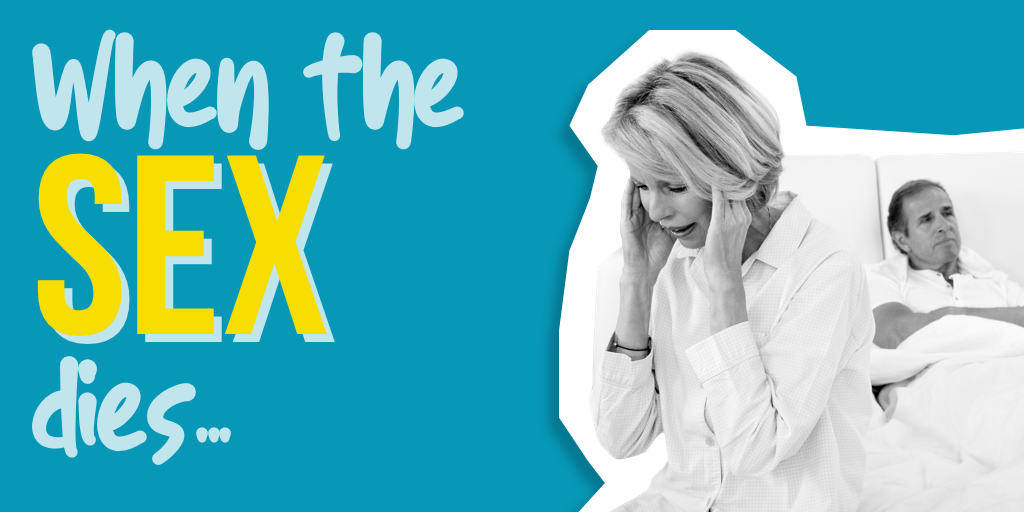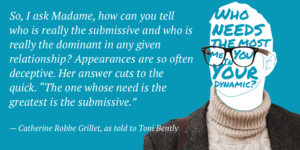Before I launch into this post, I’d like to state one thing: This is for those people who WANT sex in their relationships. There are many who are gray or ace and who don’t really care for it at all, AND THAT’S OK.
This is written to those who started strong, and would like that back, but who find themselves…well, somewhere else. No judgement. Just some thoughts and ideas.
—
Two weeks ago, someone necro’d a writing I did back in 2019, When MEN Don’t Want Sex, and suddenly, in the course of a single day, 800 new loves and over a hundred comments were added.
So, of course, I figured it needed to be dragged out again, and just yesterday did a throwback Thursday recording on the Dating Kinky podcast of the original writing, so if you’d like to connect with it, you can do so there.
That writing also linked to another older writing from 2015, Women Don’t Want Sex As Much As Men, in which I explain that in the past, many cultures have actually considered women’s sexuality the more powerful force to be reckoned with, and that assuming that men always have the higher sex drive is a mistake.
And that writing got a bit more play as well, thanks to that link.
And some more comments.
But someone loved a comment I had made on that writing in 2015, and when I reread it, I was inspired to create a new writing. Ta-da!
The comment was:
As soon as they start believing that the reason their wife does not want sex with them anymore is ‘because: woman,’ they stop taking personal responsibility for turning a woman who fucked them like a jackrabbit in the beginning of their courtship into a cold, hard block of ice.
Now, I’ll be clear. Rereading that, I cringe a little.
There is some inherently fucked up-edness in those words, so let me address that right now.
First, there are many reasons libido goes off. Some are medical. For example, medication, depression, anxiety, illness, menopause…the list goes on. And this is true of all genders (well, except the menopause thing).
Second, one partner is never 100% responsible for another’s libido. Period.
Ok. Now, with that out of the way, let’s talk about the intended heart of the point I was trying to get across.
When a woman’s libido slows down, and it’s assumed it’s slowing down because she is a woman, that stops inquiry and curiosity and possible solutions.
AND THIS HARMS WOMEN.
Women sometimes assume that, too. Everyone can get caught in the trap of thinking that women have a lower sex drive than men or that men are ALWAYS on and ready for sex, or that sex MUST die once a relationship progresses past a certain point, or after marriage.
After all, we’ve been sent these messages by society through media and told this by people we love our whole lives.
But we don’t want to blindly believe everything, right? We did let go of the Easter Bunny…
So, when one person’s libido in a relationship starts to slow down, the WORST thing you can do (as the partner or as the person) is to assume that that is just how it is.
THE WORST.
Because as soon as you make that assumption, you stop getting curious.
“Oh, so that’s what mom was talking about.”
A friend of mine, when I was in my 20s, who had been a healthy, active, sexual person before her marriage stopped wanting sex a few months in.
She chalked it up to what her mother said, that women just didn’t want it like men did, especially after marriage. She did her wifely duties, and mourned the loss of her amazing love-filled sex life. She grew more distant from her husband, who she loved dearly, because she didn’t have the magnetic draw to him any more.
They got pregnant and things improved briefly. Enough that they felt so happily optimistic. But after the baby, things deteriorated again. And they fought. And were stressed. And their marriage began to crumble. So, she went back on birth control, because one child was enough while they were rocky like that.
And suddenly, her libido was back.
Almost like it never left.
Did you know that birth control pills can change who you are attracted to sexually and by how much?
A paper published in The Proceedings of the Royal Society B in 2008 found that while women are usually attracted to the scent of men who are genetically different from them, women on the Pill are attracted to the scent of men who are more genetically similar.
Huh.
Now, I was in my 20s WAY before 2008, and this was not common knowledge. It’s still not, as far as I know. But she knew what she felt. And her marriage improved. Immediately.
And so, the next time she went off the pill to have their second (and last child), they were prepared. They talked with her doctor, who prescribed both foods and medication to help her through, and got her back on the pill as soon as her second baby was born.
And the last time I spoke with her on FB, she was thrilled to be heading off for a sexy retreat with her hubby for one of their birthdays, now that they are empty nesters. Their sex life is strong, and they are deeply in love.
Of course, that’s just one example.
A medical/medication related example at that. But it highlights ONE reason that sex could die that has nothing to do with gender. And that should definitely be explored, because health matters.
There is another reason that sex could die that has nothing to do with the physical or medical, though.
The connections (or lack) with our partners. And it’s the most common reason that couples who mate like wild bunnies in heat at the beginning of their relationship end up in bed death.
They lose connection.
Sure, at the beginning of a relationship, there is a special boost of hormones and chemicals in our brains that helps feed that libidinous need. NRE, or New Relationship Energy is a thing. It’s how nature bonds us with a potential mate. And that is not going to last forever, no matter how hard you try. Your bodies WILL get used to each other, and that uncontrollable desire will reduce.
But by how much?
Well, part of that IS up to you. Both.
Because that part is based on how you treat each other.
Do you still court each other? Do you still set time aside? Do you still date? Do you still pat each other’s butts as you pass in the hall? Do you still compliment each other? Do you still look in each other’s eyes? Do you still LISTEN to each other (and care)? Do you still make the effort to be the best partners for each other that you can be?
Or have you started taking each other for granted?
Skipping the small stuff, blowing each other off (because you KNOW how they get)? Maybe it’s just not as important to pause your show while they talk. Or you’re sick of the messes they leave in the damn sink everyday. Perhaps it’s that you’ve heard them rant about the office Karen 8,752 more times than you care to, and you wish they would just do something about the situation.
Whatever the reasons, this is a cycle. Not a vicious cycle. That implies for more passion than this cycle has. It’s a cycle of lethargy.
Sex slows (not dies) because the NRE wears off, and annoyances and resentments build, which them reduces attraction and desire for sex, which then builds more ick feelings, and so on…
Until all you’re left with is bed death (or sexual critical care or end of life) with a growing list of bullshit complaints that wouldn’t matter at all if you were just really feeling connected and sexual and in love.
Someone asked me the other day how important sex is in a relationship. I replied that it’s 80/20:
Sex is 80% of the relationship when it is bad. 20% when it is good.
So, even when it’s going really well, for me, sex is a pretty damned important and large part of my relationship satisfaction. Numbers will probably be different for everyone, although I know a lot of people relate when I share that.
But when the sex begins to die in my experience, that death begins to color everything else. Because then I feel less desired. Less loved. Less valued. My own ability to let things slide, well, slides. Smaller things annoy me faster. I get cranky. I get critical. Stressed. Have general feelings of unease and ennui…
In short, libido issues can affect everything, especially when there is no obvious reason, and the other person doesn’t seem to care.
Now, I imagine that if my partner’s libido took a nose dive, I would want to know why, and I hope my partner would care enough to want to know why as well. That they would want to go to the doctor. That they would consider whether our relationship was fulfilling. That we would discuss our desire and how to build and grow it.
And in the years we’ve spent together, our libidos have both waxed and waned. And when the waning lasted longer than a couple of weeks, we talk. And we find our way back. Together.
And he’s had low T, which we built back up. And we’ve had stress, which we’ve worked on together. And we’ve slipped a few times with our focused courtship and desire rituals, because life.
And hopefully, moving forward, we will tackle everything else as well.
I don’t have all the answers.
I barely have a few.
But the one answer that I do have and stand by is this: If you and your partner are mourning your active sex life, working together to find out why and take steps is a good place to begin.
And whether you are the one who’s libido is failing, or the one who is feeling unfulfilled (or both), be kind. Be aware of how it affects your life. And look for ways to make those connections with things other than just sex.
What are your thoughts?
Have you ever found yourself in a sexless relationship? How did it make you feel? Were you the one who lost libido, or the one wanted more than you were getting, or both?
Have you ever worked with a partner to come back from such a place together? What happened? How did that work out?









